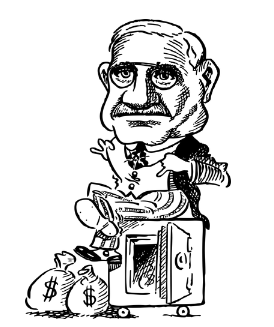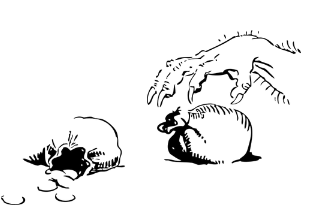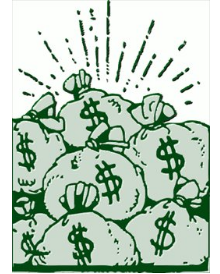October 2018
 If you’re an American like me you hear very little dinner table talk about capitalism because in the USA it’s conflated with Creation. Now there’s a spot of ideological hegemony you’d be hard pressed to outdo. In the States capitalism is just there, ostensibly God-given and unassailable, like weather. It’s a different story in Europe, of course, because of its longer history and experiential acquaintance with other economic systems. There’s a socialist stream of political and economic thought that has a real life in Europe, which died out long ago in the USA and had only a brief life in the era of the Great Depression in any case. When I lived in Germany in the 1980’s the SPD was in power — Sozialdemokratische Partei Deutschlands — the Social Democrats. The farthest we ever got in incorporating anything resembling a socialist agenda into our main political stream was Gus Hall appearing time after time on the ballot as presidential candidate for the Communist Party and of course all that ever amounted to was a joke, really. Hall was the son of Finnish immigrants who’d been socialist activists in Europe before emigrating to the States, so Gus got it from Mom and Dad via Europe — not exactly a native strain of socialism becoming manifest in American politics.
If you’re an American like me you hear very little dinner table talk about capitalism because in the USA it’s conflated with Creation. Now there’s a spot of ideological hegemony you’d be hard pressed to outdo. In the States capitalism is just there, ostensibly God-given and unassailable, like weather. It’s a different story in Europe, of course, because of its longer history and experiential acquaintance with other economic systems. There’s a socialist stream of political and economic thought that has a real life in Europe, which died out long ago in the USA and had only a brief life in the era of the Great Depression in any case. When I lived in Germany in the 1980’s the SPD was in power — Sozialdemokratische Partei Deutschlands — the Social Democrats. The farthest we ever got in incorporating anything resembling a socialist agenda into our main political stream was Gus Hall appearing time after time on the ballot as presidential candidate for the Communist Party and of course all that ever amounted to was a joke, really. Hall was the son of Finnish immigrants who’d been socialist activists in Europe before emigrating to the States, so Gus got it from Mom and Dad via Europe — not exactly a native strain of socialism becoming manifest in American politics.
Coming from the rural working class as I did, it wasn’t difficult to figure out even as an adolescent that something was rotten in the state of Denmark with regard to the economic system in which I found myself embedded. This led to serious studies — independent in nature, I hasten to add, and accompanied by no public announcement of my activity — where I investigated capitalism in general and more particularly in its American manifestation. Those studies continued throughout my 20’s and 30’s and formed a key element of my graduate studies, although I didn’t specialize in economics. Something was emitting a stench and I was determined to find it because the stink was unbearable. The search led me into the work of the Frankfurt School, about which I’ve written a separate post (here). As I dug deeper into the issue its boundaries kept growing larger and larger, until finally I realized that economics was only part of the issue. In point of fact, we had a juggernaut on our hands with nobody except a few academics even paying attention to the problem. Yikes.
 As I became older my thoughts didn’t change much but my perspective did. I began to see things sub speciae aeternitatis — from the long view, to put it in plebe terms — and looked at capitalism more from the historical perspective, wondering what its trajectory would be into the future and how it might be traced by future historians looking back at our period with all its hoopla. We wage slaves trundled along in our appointed paths in the capitalist hierarchy as we’d always done, but then things started going really wonky. The cycle of boom and bust — inherent to capitalism, although I’ve yet to understand why it’s inevitable, since we ourselves cause it — sped up so that the busts came more often. Annoyingly often. Then in 2008 the Big Oops came that sent all kinds of folks down the economic drain. Fortunately I wasn’t exposed to the market in any big way at the time and sailed through the crisis with nary a hair out of place. But it’s sobering to see general economic pandemonium spread like wildfire while one attempts to carry on circumspectly with one’s affairs.
As I became older my thoughts didn’t change much but my perspective did. I began to see things sub speciae aeternitatis — from the long view, to put it in plebe terms — and looked at capitalism more from the historical perspective, wondering what its trajectory would be into the future and how it might be traced by future historians looking back at our period with all its hoopla. We wage slaves trundled along in our appointed paths in the capitalist hierarchy as we’d always done, but then things started going really wonky. The cycle of boom and bust — inherent to capitalism, although I’ve yet to understand why it’s inevitable, since we ourselves cause it — sped up so that the busts came more often. Annoyingly often. Then in 2008 the Big Oops came that sent all kinds of folks down the economic drain. Fortunately I wasn’t exposed to the market in any big way at the time and sailed through the crisis with nary a hair out of place. But it’s sobering to see general economic pandemonium spread like wildfire while one attempts to carry on circumspectly with one’s affairs.
Lately the stock market has been going up and down like a barmaid’s knickers. Since I’m only marginally exposed to the market it’s like playing a video game, watching a few thousand dollars appear or disappear based on some mysterious workings of something behind the scenes. It’s like playing dice, all very amusing as long as nothing important is involved. Gambling is what in fact we’re talking about. Our economic system is in many regards just another game of chance.
The only possible conclusion based on the circumstantial evidence from my own lifetime is that capitalism is a thoroughly dodgy business. It’s not stable. You rely on it at your peril. Living in it is like residing in a major fault zone or on the slopes of Vesuvius. You never know when all hell will break loose and you’ll end up on the skids. That’s no place for a lady, obviously. Austerity? Oh please. Give up my weekly salon appointment? Are you NUTS? That’s not what I signed up for when I was presented the tacit contract with “American Dream” sprawled across the top of the page.
What happens on the floor of the Stock Exchange has always summed up capitalism perfectly in my opinion. At the very center of our economic system, the Vatican of capitalism, what do you find? Chaos. Pandemonium. It looks like somebody just detonated a bomb. In this we trust? Not this gal, no siree. I know a mess when I see one, thank you very much, and I don’t need a new prescription for my glasses.
It all looked so much safer when I was young, what with a chicken in every pot (well, that was the idea anyway) and a single strand of pearls around the necks of housewives as they vacuumed their suburban carpets. But apparently market economists speak with forked tongue. Capitalism giveth and it taketh away. One might also point out that for a supposedly self-regulating system, some greedy pusses get their grubby little hands into the pie and come out with far more blackbirds than they should by right have while the rest of us sit waiting for our share with a growing sense of unease. Since the Big Oops of 2008 the unease has escalated into outright anxiety, since the cat came out of the bag about what had been going on behind closed doors all those years the Yuppies were at their dodgy business. We’re still in the aftermath ten years on. Again, no place for a lady, I don’t care how many strands of pearls she has round her neck.
 The voices critical of capitalism these days come, surprisingly, from inside rather than outside the system. In the 50’s and 60’s the critics were outsiders. I think back to Paul Sweezy (info here) and Paul A. Baran (info here) who wrote Monopoly Capital (here) — both were Marxist economists, an animal of rather rare occurrence in the zoology of the American university these days. By being openly Marxist-aligned they put themselves outside the American mainstream and chose to represent a minority opinion. The work they did is very good — I read Monopoly Capital in the 1980’s and thought it both brilliant and still applicable to the state of things 20 years after its first publication — no surprise there, since the system hasn’t changed in any fundamental way.
The voices critical of capitalism these days come, surprisingly, from inside rather than outside the system. In the 50’s and 60’s the critics were outsiders. I think back to Paul Sweezy (info here) and Paul A. Baran (info here) who wrote Monopoly Capital (here) — both were Marxist economists, an animal of rather rare occurrence in the zoology of the American university these days. By being openly Marxist-aligned they put themselves outside the American mainstream and chose to represent a minority opinion. The work they did is very good — I read Monopoly Capital in the 1980’s and thought it both brilliant and still applicable to the state of things 20 years after its first publication — no surprise there, since the system hasn’t changed in any fundamental way.
Since 2000 things have taken another turn. The failures and transgressions of capitalism have begun to bite too deeply and in too many places. Regular folk are getting upset as the social erosion from income polarization increasingly puts paid to what we all held to be “The American Dream.” We now have a middle class in process of disappearing like the golden toad in Central America. Millennials are hard pressed to find a way into adult life on terms of economic self-sufficiency that people my age took for granted when we were young. The potential for all this nastiness lay in the very economic system that produced the Ike Era with its strong middle class, but nobody (except the Commie pinkos) paid much attention to the internal processes that would bring such disagreeable potentials to bear on our lives. Now that they’ve arrived, they seem just to have “happened.” That’s the story on the street. It’s a con job, of course — it didn’t just “happen,” we made it happen by pursuing exactly those tendencies in capitalism that eventually bring the social structure into crisis. That should come as no surprise to anybody — we’re doing the same thing with the environment by precipitating the Sixth Mass Extinction, about which I’ve written a separate post (here). Since we end up doing the same thing in different domains of life, it appears that the tendency to do stupid things and think later (if at all) is native to us. Not good. And once again no place for a lady.
So we now have developing among people who live in capitalist societies in the West (including, mirabile dictu, the United States) a stream of critique that doesn’t all come from those wacky Marxists. The critics draw on analysis from the Marxist stream because they have few other places to turn — Milton Friedman is of no use to them, obviously — but the protest is native and decidedly not academic in nature. It’s about how life gets lived on the ground — or doesn’t get lived. The protests are piling up these days because life is getting harder, not easier, and that wasn’t the promise the market economists made when they set capitalism before us with its four and twenty blackbirds lo these many years ago. In fact it looks like they’ve been selling us a huge bill of goods.
There are a few hardy souls who carry on the Marxist critique and what they say makes more sense than ever. I recently came across an excellent article by John Bellamy Foster and Robert W. McChesney, “Capitalism, the Absurd System: A View from the United States” that hits hard and in all the right places. The article appeared in Monthly Review in June, 2010 (full text here). In the interests of transparency I should mention that the magazine is avowedly socialist, founded in 1949 by a group that included Paul Sweezy, mentioned above as the co-author of Monopoly Capital. The publication has endured all these years, even through the McCarthy Era when it got some of the editorial group into serious hot water. Sweezy himself was prosecuted all the way to the Supreme Court, but happily it ruled in his favor so he avoided going to prison. One point for the away team. Foster is of my vintage, teaches sociology at the University of Oregon (and we all know those old hippies in Eugene are lefties, so no surprise there LOL), and just happens to be the editor of Monthly Review. He’s essentially a next generation Sweezy. More power to him, that’s what I say. His website is here if you want to check out what he’s been up to lately.
The article covers a lot of ground and raises several important points. Just the section headings are pregnant with significance: “Behind the Veil of Money,” The Plutocratic System,” “The Renewal of Socialism,” “Getting Serious.” I’d like to focus on one particular paragraph from the section entitled “Behind the Veil of Money”, which reads as follows:
A lot of this damage to individuals has to do with our lack of concern for collective
needs. The physical infrastructure of the United States—the built environment of our
cities, roads, railroads, bridges, public water and electrical systems, parks, etc.—is
crumbling. The per capita ecological footprint of the United States far exceeds what
can be sustained at a global level, contributing to rapid degradation of the earth
system. Public education throughout the country is in marked decline. Much of what
we produce is nonessential, indeed waste, including wasted labor. The United States
has fully lived up to John Kenneth Galbraith’s observation half a century ago that
modern U.S. capitalism generates “private wealth” and “public squalor.”
 The importance of this paragraph for me is the link it establishes between economic and environmental reality due to capitalism’s “lack of concern for collective needs.” As is too often the case with human constructs, capitalism has tunnel vision. It’s self-referential and concerned only with its own processes and products. It cares not a whit how those processes and products affect aspects of reality that lie outside what it considers to be its purview and disclaims any responsibility for those other domains. No wonder it gets us into hot water. Reality doesn’t work that way. We’d have figured that out long ago if we paid more attention to Nature.
The importance of this paragraph for me is the link it establishes between economic and environmental reality due to capitalism’s “lack of concern for collective needs.” As is too often the case with human constructs, capitalism has tunnel vision. It’s self-referential and concerned only with its own processes and products. It cares not a whit how those processes and products affect aspects of reality that lie outside what it considers to be its purview and disclaims any responsibility for those other domains. No wonder it gets us into hot water. Reality doesn’t work that way. We’d have figured that out long ago if we paid more attention to Nature.
Capitalism’s cavalier disregard for long-term outcomes suits human beings to a T, however, because it fits exactly how we operate as a species. We pursue our species-interests ignoring their effects on the biosphere, unconcerned about their long-term effects even on ourselves. Capitalism’s ideological position in American society remains unassailable despite all the evidence that it’s leading us down a dead-end street. Our civilizational patterns have also led us down an environmental dead-end street, so at least we’re consistent. As I discussed in the post about the Sixth Mass Extinction, we’re well on the way to causing general collapse in the biosphere with our carbon-emitting ways and our rampant population growth. The scientific evidence for that assessment is plain and incontrovertible, yet those humans responsible for administering some kind of responsibility at the collective level can’t seem to get things organized to change the pattern in any significant way. In short, we’re a juggernaut both economically and environmentally.
 Let’s take a close look at what John Kenneth Galbraith (who was nobody’s fool) said in the citation above: modern American capitalism generates “private wealth” and “public squalor.” Is it true? It wasn’t obvious in the past, when Dad worked at the same company for 30 years and got a handsome pension at retirement in addition to Social Security. Things went wonky in the 1980’s with deregulation and the rise of what is rightly called “casino capitalism.” We had people going nuts in the stock market and coming up with all kinds of dodgy stuff that was bound sooner rather than later to bring the whole thing crashing down around our ears. That’s exactly what has happened, more than once. We taxpayers paid the bill for it, powerless to stop the process that gave billions of dollars of public funds to the creeps who’d just burned the house down.
Let’s take a close look at what John Kenneth Galbraith (who was nobody’s fool) said in the citation above: modern American capitalism generates “private wealth” and “public squalor.” Is it true? It wasn’t obvious in the past, when Dad worked at the same company for 30 years and got a handsome pension at retirement in addition to Social Security. Things went wonky in the 1980’s with deregulation and the rise of what is rightly called “casino capitalism.” We had people going nuts in the stock market and coming up with all kinds of dodgy stuff that was bound sooner rather than later to bring the whole thing crashing down around our ears. That’s exactly what has happened, more than once. We taxpayers paid the bill for it, powerless to stop the process that gave billions of dollars of public funds to the creeps who’d just burned the house down.
The track record of capitalism just within the span of my own lifetime is a litany of idiocy so appalling that the system deserves to be scrapped on that evidence alone. But on we merrily go, thinking it the only arrangement possible for human economic life. And we continue to suffer the consequences: we generate ever more concentrated private wealth while public squalor spreads about us with a momentum that seems unstoppable. We think it’s an act of God rather than the result of some very foolish ways we ourselves do things. The right hand knoweth not, etc. etc.
There’s another striking parallel in the progression of American capitalism I’ve not yet seen mentioned in anything I’ve read to date. If you follow Galbraith’s quip to its logical conclusion, what do you end up with? I’ll tell you what: the societal conditions of a Third World country. I’m being un-PC by using that term, I quite realize, but let’s call a spade a spade, shall we? It’s late in the day and we haven’t much time left before things go completely belly up. I currently live in a “developing country” (to use the PC term). Its society is characterized by exactly what Galbraith qualifies as characteristic of modern American capitalism: increasingly concentrated private wealth and growing public squalor. The members of the Philippine House of Representatives are with only a few exceptions millionaires, which means they belong to the infamous 1% of wealth holders in this poverty-stricken country. Public funds are regularly squandered in a morass of inefficiency and corruption, billions of pesos fly out the window every fiscal year and land in the pockets of the ruling elite (for more detail on that issue, see my post here). There’s no middle class to speak of in the Philippines — there are only the (few) wealthy and the (many) poor. Sounds like Galbraith’s dire scenario to a T, if you ask me.
 And that’s exactly where the trajectory of American capitalism is heading, to the same split between a handful of wealthy people and a vast majority of the population who constantly struggle to make ends meet. One hopes it will be a long time yet before the level of public squalor on display in the Philippines becomes evident in the USA, but if trends continue as they’re going with the disappearance of the middle class and the increase in poverty, it’s only a matter of time until things in the USA look similarly ramshackle. Some things like the interstate highway system are already in big trouble.
And that’s exactly where the trajectory of American capitalism is heading, to the same split between a handful of wealthy people and a vast majority of the population who constantly struggle to make ends meet. One hopes it will be a long time yet before the level of public squalor on display in the Philippines becomes evident in the USA, but if trends continue as they’re going with the disappearance of the middle class and the increase in poverty, it’s only a matter of time until things in the USA look similarly ramshackle. Some things like the interstate highway system are already in big trouble.
Let’s restate the point just to make it crystal clear: American capitalism in its current developmental trajectory will lead the United States into economic and societal conditions typical of a Third World country.
There’s large body of recent work on the issue of capitalism’s economic failures and social transgressions. I’ve been going through some of it in the past month and find that the conclusions I came to under my own power as a non-economist fall largely into agreement with the points the experts bring forward. That coincidence encourages me because it points out that understanding the problem doesn’t require arcane knowledge available only to specialists. The power of observation without ideological blinders on will do the job if you stick with it for a while and sort your way through the muddle.
Richard D. Wolff (website here), a Marxian economist who studied with Paul Baran, is a powerhouse of critique of capitalism these days and has found a groundswell of interest in his message that keeps him busy charging all over the country giving talks. Other important works have come out in the past few years by economist Joseph Stiglitz on inequality (here) and by journalists Chris Hedges (here) and Steven Brill (here). I’m currently reading Brill’s book Tailspin, which is excellent. It has the effect on me I imagine would result from watching the video of a fatal car crash replayed in slow motion. Robert Reich’s latest book The Common Good (here) discusses a core value one would suppose to be matter of fact in a representative democracy — a “duuh” moment. Instead, Reich finds himself urged to plead the case for a return to active concern about the common welfare in the society we inhabit, which shows just how far off the tracks the derailments of our economic life have pushed the social structure in which we now live so uneasily and so contentiously.
I can’t imagine any of these analysts would dare to make the comparison between the emerging social structure in the USA and that of a Third World country — just imagine the tweet storm that would unleash! It’s clearly the case, of course, but that doesn’t mean it’s permissible as evidence. In the matter of ideology, evidence is the first thing to go out the window. Since I’m a nobody I can get away with it, so I’ll say it again: the USA is heading toward the kind of society we’ve excoriated in other parts of the globe as “Third World” and “corrupt.” Those words are on the ends of fingers turning to point straight at us. It is meet and right that they do so, because we’re guilty as charged.
Given the juggernaut momentum behind this trajectory, it’s highly unlikely we’ll see any turnarounds before the grimness hits the red mark on the gauge. It’s started already, of course, to the point that finding a quiet spot out of the way of things seems a very good idea. Fortunately I’ll be dead before we reach the worst of it, so it’s no biggie to me, but I do feel for those who’ll extend farther into the future. If the collapse of the biosphere doesn’t get them, the degradation of the economic and social fabric will complete their nightmare instead.
Where’s that American Dream got to, and hey, who swiped my single strand of pearls? I was going to vacuum, I can’t possibly do that without being properly accessorized … 🙁
The thing that most makes my head shake back and forth in all this nonsense is that we are the problem. Nobody’s holding us at gunpoint to do things this way and nobody’s stopping us from doing things differently. Things could have been organized differently from the get-go if we’d used that big human brain we’re so proud of. Apparently in that particular regard size doesn’t matter. Rather than come up with something sensible, we trudge along in our rut bitching about how things aren’t working, watching things go down the toilet. And we’ll go on bitching until the system collapses or the degradation of the biosphere puts paid to any kind of economic system with environmental terms that are decidedly not negotiable no matter how rich you are.
As I said in another post, I have my fingers crossed that the next round of evolution puts a bit more sentience into the next sentient species to evolve on the Planet. When you look at our track record, the only possible conclusion is, ‘Oops, back to the drawing board, and pronto …”
On that happy note, I’m off to the mall. There’s a four-day sale going on with tons of buy one get one free, woohoo! I’m gonna hit that ATM and go nuts. Ta dollings 🙂

